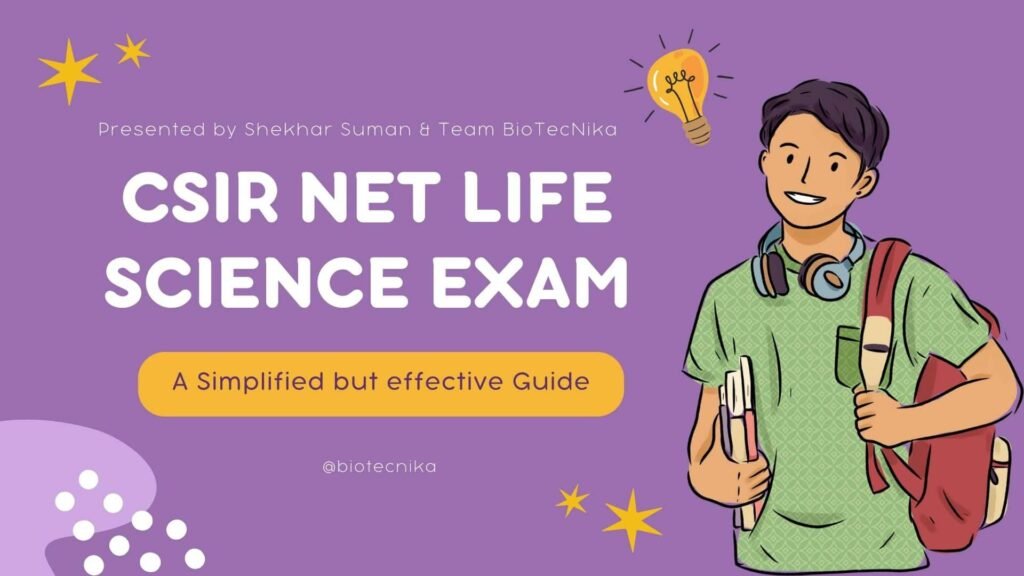The Council of Scientific and Industrial Research – National Eligibility Test (CSIR NET EXAM) preparation process can be challenging but rewarding. A comprehensive preparation guide is provided below:
Learn about the Exam Pattern and the Coursework Exam Pattern:
The CSIR NET exams consists of three sections of multiple-choice questions: Part A (General Aptitude), Part B (Subject-Related Questions), and Part C (Higher Value Questions that may test the candidate’s knowledge of scientific concepts and/or their application to real-world situations) are the three sections of the test.

Syllabus:
Comprehend the topics covered in each section of the detailed syllabus for your subject (Life Sciences, Physical Sciences, Chemical Sciences, Mathematical Sciences, or Earth Sciences).
- Make a Study Plan and Manage Your Time: Give distinct timeslots to each subject and topic. Be sure to cover every topic, and give extra time to difficult ones.
Daily targets: To monitor your progress, set daily, weekly, and monthly objectives. Make sure your study schedule is adaptable and attainable.
Obtain Study Aids Books:
For each subject, select standard textbooks and reference books. Popular CSIR NET preparation books include:
Sciences of Life: ” “Ecology” by Odum, “Principles of Biochemistry” by Lehninger, and “Molecular Biology of the Cell” by Alberts.
Science of the Physical: H.C. Verma’s “Concepts of Physics” and David J. Griffiths’ “Introduction to Quantum Mechanics” are two examples.
Sciences of Chemicals: Morrison & Boyd’s Organic Chemistry and J.D. Lee’s Inorganic Chemistry.
Numerical Sciences: ” Higher Designing Science” by B.S. Grewal, “A First Course in Dynamic Polynomial math” by John B. Fraleigh.
Natural Sciences: “Structural Geology” by Marland P. Billings and “Principles of Geology” by Charles Lyell.
Web-Based Resources: Utilize online stages like NPTEL, Coursera, edX, and YouTube for talks and instructional exercises.
Regularly practice past year papers:
Exam pattern and difficulty level can be learned by completing question papers from previous years.
Mock Tests: Take frequent practice tests to improve your exam temperament and discover areas for improvement.
Revision: To keep the information you’ve learned, revisit the subjects you’ve studied frequently.
Focus on Important Topics:
Prioritize the syllabus’s high-weighted topics in your study plan.
Concentrate on reasoning, data interpretation, and quantitative aptitude for Part A (General Aptitude).

Participate in Study Groups or Coaching
Join a coaching institute for structured guidance and study resources if necessary.
Concentrate on Gatherings: Join or form study groups to discuss challenging concepts and collaborate on problem-solving.
Remain Refreshed
Keep yourself refreshed with late logical turns of events and exploration papers pertinent to your subject.
Maintain a healthy sleeping schedule:
Guarantee satisfactory rest and breaks during your review meetings.
Diet: Eat well to stay mentally and physically fit.
Exercise: Physical activity on a regular basis can aid in stress reduction and enhance concentration.
Asking help from Teachers, Seniors, Mentors:
. When you’re stuck on a subject, don’t be afraid to ask for help from your teachers, mentors, or peers.
Maintain a Optimistic and Motivated Attitude
Maintain a positive outlook on your preparation.
Keep yourself inspired by using inspirational quotes, success stories, or personal goals.
You can improve your chances of passing the CSIR NET exam by adhering to this comprehensive guide and making consistent efforts. Have fun!
Also Read : Top CSIR Net Life Sciences Books for The Upcoming Exam
Why Guidance is important for preparing exams ?
Direction is vital for the planning of CSIR NET (Board of Logical and Modern Exploration Public Qualification Test) tests in light of multiple factors:
Understanding the Schedule and Test Example: Appropriate direction assists competitors with understanding the definite schedule and test design. Knowing what to concentrate and how the test is organized is fundamental for successful arrangement.
Concentrate on Material Determination: With various books and assets accessible, direction from experienced people or coaches can help in choosing the right review materials, which are compact and pertinent.
Using time productively: Compelling direction can assist in making an organized report with arranging, guaranteeing that up-and-comers distribute satisfactory opportunity to every point and subject, consequently covering the whole schedule proficiently.
Reasonable Clearness: Direction from educated tutors or instructors can give a more profound comprehension of intricate ideas and themes, which is vital for responding to questions accurately.
Practice and Update: Customary direction can help in distinguishing significant regions for training and modification, guaranteeing that competitors don’t pass up reconsidering basic subjects.
Mock Tests and Past Papers: Direction frequently incorporates admittance to deride tests and earlier years’ inquiry papers, which are fundamental for understanding the sort of inquiries posed and for self-evaluation.
Inspiration and Certainty: Planning for serious tests can be unpleasant. Direction from coaches can give inspiration, support certainty, and help in keeping an uplifting outlook all through the readiness period.
Critical thinking Strategies: Experienced coaches can show critical thinking procedures and easy routes, which can be profoundly useful during the genuine test.
Tending to Feeble Regions: Direction helps in recognizing and zeroing in on frail regions, guaranteeing a decent planning across all subjects.
Keeping Refreshed: Tutors and training establishments can give refreshes on any progressions in the test example, prospectus, or significant dates, it are good to go and informed to guarantee that competitors.
Generally speaking, direction goes about as a guide, assisting up-and-comers with exploring through their readiness process all the more successfully and proficiently.


